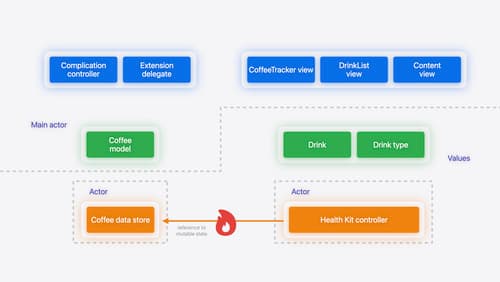Usage of actors
Asked on 2024-09-08
1 search
Actors in Swift are a feature designed to help manage concurrency by encapsulating shared mutable state and ensuring that only one task can access that state at a time. This is achieved by serializing accesses to the actor's state, which helps prevent data races. Calls to actor methods from outside the actor's context are asynchronous, requiring the use of the await keyword.
In the session titled "A Swift Tour: Explore Swift’s features and design," actors are discussed as a convenient feature for making concurrent accesses safe. By converting a shared resource, like userstore, into an actor, accesses are synchronized, eliminating concurrency errors. This allows for safe concurrent programming by ensuring that only one task can execute on an actor at a time.
In the session "Migrate your app to Swift 6," actors are used to improve concurrency architecture by isolating tasks to specific actors, such as the main actor for UI updates and dedicated actors for background operations. This session also discusses the use of the mainactor assume isolated method to inform the compiler that certain code is already running on the main actor, which helps prevent race conditions.
For more detailed information, you can refer to the following sessions:

Migrate your app to Swift 6
Experience Swift 6 migration in action as we update an existing sample app. Learn how to migrate incrementally, module by module, and how the compiler helps you identify code that’s at risk of data races. Discover different techniques for ensuring clear isolation boundaries and eliminating concurrent access to shared mutable state.

Compose interactive 3D content in Reality Composer Pro
Discover how the Timeline view in Reality Composer Pro can bring your 3D content to life. Learn how to create an animated story in which characters and objects interact with each other and the world around them using inverse kinematics, blend shapes, and skeletal poses. We’ll also show you how to use built-in and custom actions, sequence your actions, apply triggers, and implement natural movements.

A Swift Tour: Explore Swift’s features and design
Learn the essential features and design philosophy of the Swift programming language. We’ll explore how to model data, handle errors, use protocols, write concurrent code, and more while building up a Swift package that has a library, an HTTP server, and a command line client. Whether you’re just beginning your Swift journey or have been with us from the start, this talk will help you get the most out of the language.
